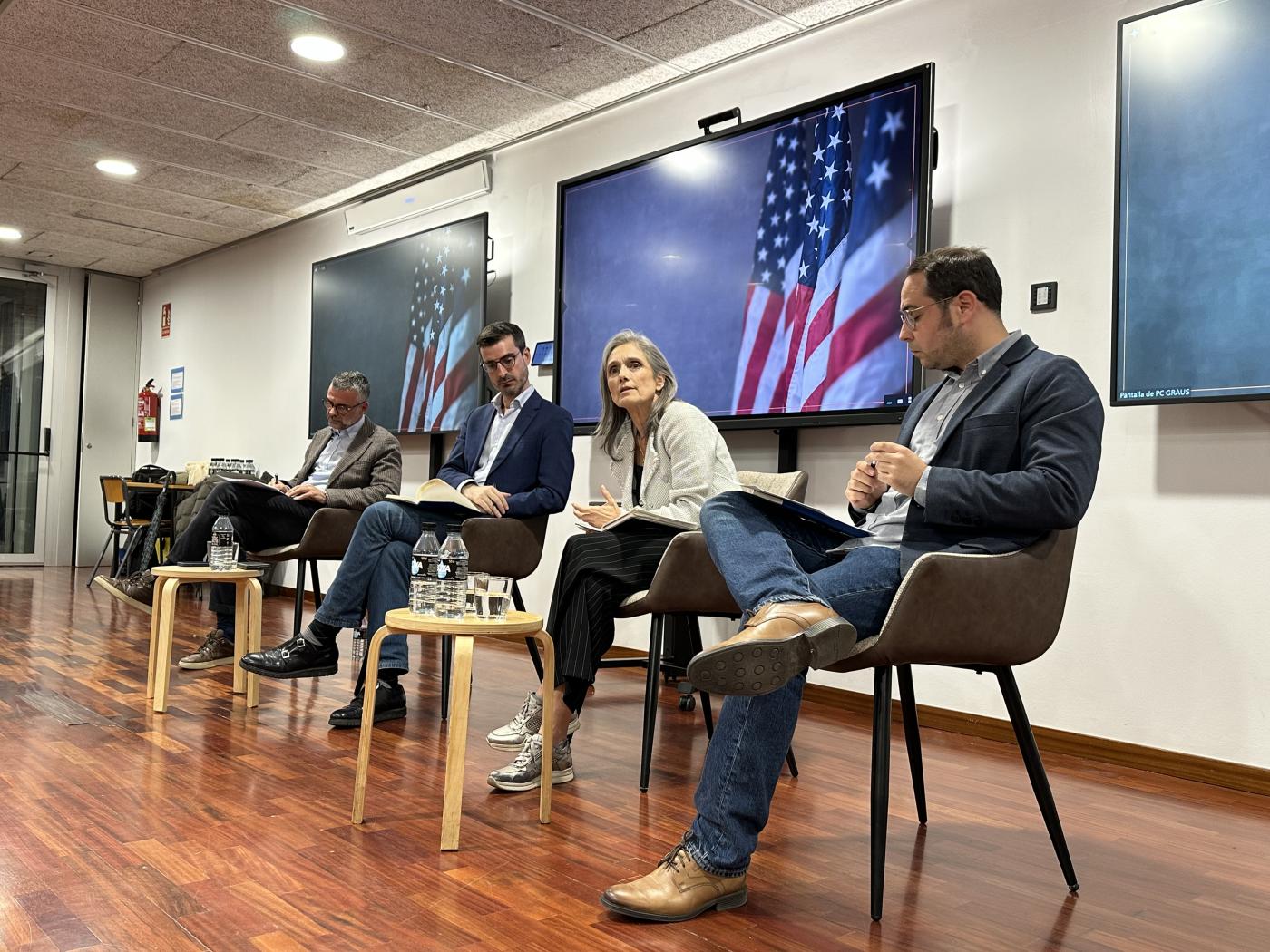The elections in the United States of America (USA) are the focus of the world's attention and La Salle Campus Barcelona, a founding member of the Universitat Ramon Llull, is no stranger to current events and is establishing itself as a space for debate and analysis to try to provide answers to the questions that concern us. In the words of the General Director of the campus, Josep M. Santos: “In a previous meeting organized by the Faculty of Philosophy, we spoke of the university as a community of professors and learners, and that is what we want to be: spaces for debate, learning, democratization of knowledge, research and knowledge transfer to society”. In this sense, the La Salle Faculty of Philosophy wants to be an active agent of change and periodically organizes colloquiums to debate leisurely on current issues.
On this occasion, the series was called Democracies in Danger?: Debate on the United States Elections and brought together experts in political science, constitutional law and political philosophy to analyze the consequences of Donald Trump's victory in the elections of November 5 in the United States. The speakers at the event were Pablo Simón, PhD in Political and Social Sciences and Professor at the Universidad Carlos III; Jordi Feixas, PhD in Political Philosophy and Professor at the La Salle Faculty of Philosophy; and Montserrat Nebrera, PhD in Law and Professor of Constitutional Law at the International University of Catalonia. The moderator of the event was Santi Vila, PhD in Contemporary History and Professor at the La Salle Faculty of Philosophy.
The results of the US elections, at the center of the debate
The main topic of debate was to analyze the results of the elections in the USA. Pablo Simón started the speech, pointing to a “re-alignment of positions in the United States, with the popular classes giving more support to the Republican party and the elites to the Democratic party”; and to the economy: “The inflationary crisis has had a fundamental impact on the electoral results”. For his part, Montserrat Nebrera focused on aspects such as polarization, disinformation and the popular will to break with “political parties that have become job providers and facilitators”, and that “can end up becoming a trap”.
Jordi Feixas’ philosophical perspective pointed out that liberal democracies have been in crisis since the 19th century: “We have the feeling that it is a new crisis but we have been living it for years and it is the result of a crisis of moral ideas”. Feixas delved into the economic issue raised by Pablo Simón: “When you can't afford something, you lose more than just the purchase of material goods, you lose a social position, a meeting point with the community and a way of doing and living. Trump has appealed to the loss of this social position while the Democrats focused their struggles on cultural wars that do not alter the daily lives of many people.”
From the USA to the world: crisis of liberal democracies?
The debate about the United States was extrapolated to the rest of the world's liberal democracies, with the underlying question of whether democratic values are being eroded. Montserrat Nebrera criticized the view from a European perspective: “What do we mean by democratic will? Because if it is only when we agree, we have a problem”, and pointed to one of the reasons for the rise of many authoritarianisms: “Between freedom and security, many prefer security”. Pablo Simón quoted to the writer Mark Twain to say that “history does not repeat itself, but it rhymes”, and observed a novelty with respect to recent years: “Although it had taken us thousands of years, we had now managed to have people who think differently peacefully exchange power, but now there is a new fact: the legitimacy of democratic results is denied”. Simón also analyzed a factor that promotes “electoral authoritarianisms”: “Many people think that a democratic system that is not capable of guaranteeing their well-being is not worth it”.
Finally, Jordi Feixas stated that “when an imbalance occurs, the parties react hyperbolically. We have seen a hyperbolic reaction between the tendency towards democratic emancipation and the tendency towards republican entrenchment”. And he concluded: “As much as the liberal world creates the illusion that each person thinks differently, underneath each thought there is a common ideal. People in a community laugh and cry over the same things, but this has now changed, and when this happens problems come”.
The university as a forum for debate
During the question and answer session, students on campus demonstrated their knowledge and critical thinking by contributing topics for debate such as the difficulties of the Democratic Party in connecting with the popular classes, the real power that a government should have and the absence of a debate on public health in the USA, among others.
The Sala de Graus brought together students from the different areas of knowledge that make up the campus, as well as members of the FUNITEC board of trustees, deans and school directors, academic coordinators, professors and researchers. Coming from different fields and disciplines, their presence highlighted the objective that, in the words of the Dean of the La Salle Faculty of Philosophy, Carles Llinàs, the political cycles organized by the faculty have: “We want these colloquiums to bring together professors and students from different disciplines and to be able to contribute our humanistic perspective to the debate that is generated on campus.” The objective was achieved: speakers and attendees from different fields formed a space for debate, learning, research and knowledge transfer to society. A community of professors and learners, after all.

